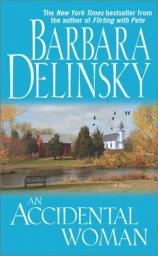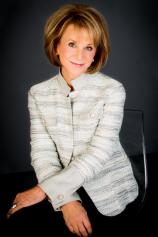Interview: July 26, 2002
July 26, 2002
Barbara Delinsky, author of AN ACCIDENTAL WOMAN, has written and published sixty-five novels in a variety of genres. Delinsky reveals the meaning behind her title and the difficulty of resurrecting characters from a previous novel in this interview with Bookreporter.com's Roberta O'Hara .
BRC: Who is the accidental woman? Is it Poppy or is it Heather? Did the title come to you after the writing of the book, or was it there all along? And did you intend the title to be somewhat of a mystery in and of itself?
BD: The title of the book came about half-way through the writing. It has multiple meanings in the story - and yes, I did intend it to be something of a mystery. Is it Poppy or Heather? It's actually both. Poppy and Heather are the women they are because of accidents in which they were involved. Taken another way, Poppy and Heather are "accidentally" women in that neither one planned to find a mate; accidents of fate tossed them in with Griffin and Micah, respectively. But the meaning of the title goes beyond even that. Here's the thing. My readers identify with my characters; they see their own problems in these fictitious people. I deliberately titled the book "an" accidental woman rather than "the" accidental woman because, in truth, this phrase may well fit you or I or any one of my readers.
BRC: Your characters are all round, fully-developed individuals, but Poppy seems to take center stage as the main character in the story. Was that how the story started out? How did Heather become a minor character in the book, when the mystery revolves around her?
BD: I wrote "An Accidental Woman" first and foremost to tell Poppy's story. Heather is simply the vehicle I chose to do this. The mystery may revolve around her, but the mystery is only a small part of this book. The larger part deals with guilt, with the cost of suppressing one's past, with the ways in which we sometimes hold ourselves back from leading rich and fulfilling lives. Heather Malone is a catalyst for Poppy's growth; in facing the mystery of Heather, Poppy is forced to act, to reflect, to look at her own life - and ultimately to reach for her dreams.
BRC: Several of the characters are resurrected from an earlier work --- LAKE NEWS. Did having existing characters and personalities and histories make the writing of An ACCIDENTAL WOMAN easier? Did you enjoy revisiting these characters? Will any of these same characters reappear in future stories? (I think we'd all like to see what happens to Poppy and Griffin.)
BD: Funny, but I thought that it would be easier to write a story with characters and personalities already established. Wrong. I discovered that when you go back to a setting from another book, you have to make sure that everything is the same as it was in the previous book, and that's hard! You also have to work within certain preset guidelines, though your new plot may cry out for things to be different. It was definitely a challenge, but I do love challenges. Will these characters reappear in another book? I'm not planning it at this time, but there is part of me that feels Lake Henry needs to be visited in summer ...
BRC: Which character did you sympathize with most? Why?
BD: Poppy. Who else? Poppy was strong and upbeat, and I respected that. She was loving and caring, and I respected that, too. She was also walking around, euphemistically speaking, shouldering a heavy load of guilt. She had a secret. It haunted her. She had reasons not to tell it and might well have gone to her death with the secret untold. That would have been the easy thing to do. That she did the hard thing - the right thing - made me love her all the more. When it came to her disability, she had determination and grit. I found Poppy to be all the more inspiring because of that.
BRC: I found the details about the harvesting of maple syrup to be fascinating. Why maple syrup? Did you choose this because of the region you were writing about? What research did you do?
BD: Why maple syrup? "An Accidental Woman" is set in a small New Hampshire town in late winter, and maple syrup production is truly part and parcel of life in many small New Hampshire towns in late winter. So that was one reason why I used it as a backdrop. Another is that I was fascinated with it myself and wanted to learn more. Another is that I knew my readers would be just as intrigued. I have always viewed the small towns I create as characters; characters have varied looks and smells; maple syrup is one facet of the character of Lake Henry. As for research, I did a lot. I read books and web reports, but mostly I worked with actual sugarmakers. They were totally gracious, totally eager, totally knowledgeable. I count their friendship a blessing.
BRC: When did you start writing?
BD: I started writing 22 years ago. Never dreamed it would come to this! How lucky I am.
BRC: Which authors do you read with regularity?
BD: No specific repeat ones. Right now, I'm on a kick of reading children's classics - "Little Women," "The Yearling," "A Wrinkle in Time."
BRC: I am always curious about a writer's routine. What is a day in the life of Barbara Delinsky the writer like?
BD: Busy. And disciplined. I read the newspaper (a major source of ideas) every morning at 6. By eight I'm at my computer. When I'm nearing a deadline, I'll work until six or seven at night. Earlier in the course of a book, it's five pages or 2 pm, whichever comes first. The hours after 2 pm are filled with the business side of my work - like answering questions such as yours!
BRC: What are you working on now?
BD: Right now, I'm working on "Flirting With Pete." Based on a novella that I wrote seven years ago, this is a story of reality versus imagination - what is real versus what we want to be real - the ways in which we fool ourselves when reality hurts. On another level, it tells of the complex relationships we have with our parents, both when they're alive and when they're dead. "Flirting With Pete" will be published in the summer of 2003




